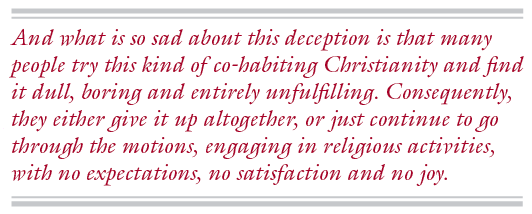Back to series



Becoming a Disciple of Jesus
Click here to open a Print - Friendly PDF
Since the U.S. government moved to an all-volunteer military in the 1970s the Army has advertised itself to potential recruits in various ways. In the 1980s the slogan was “Be all that you can be. Join the U.S. Army” or “It’s a great place to start.” The Army provided training that would prepare you for the job market, and through the G.I. Bill you could earn money for college. It was a great deal: Do yourself a favor. Fulfill your potential. Be all that you can be. Things were relatively peaceful in those days, and being in the Army was almost like enrolling in a technical college for four years, with some physical training and discipline thrown in.
But in 1991, when the First Gulf War began, all these new Army recruits were suddenly saying, “You mean I have to leave my family and fight a war? You want me to go to Saudi Arabia? Where in the world is Qatar? Excuse me, but that’s not in my contract.” But, of course, it was—”Sorry, soldier; you didn’t read the small print. You go where we want you to go.”
Now the Army ads are much different. In fact, they are often addressed more to the parents than to their sons and daughters. In a time of prolonged war, with a deadly combat zone, it is the parents who are the most hesitant about Army service. One ad basically says, when your child talks about enlisting, listen before you just say No. Another tries a form of flattery—”You made them strong; We’ll make them Army strong.” Things have changed.
As you look at the ministry of Jesus in the gospels you see that he was attracting a large army of people who surrounded him wherever he went. They thought that his journey to Jerusalem was a victory march for the crowning of the Messiah. They wanted to be there when he claimed his throne—to bask in his reflected glory and to grab a share of the prize for themselves.
But Jesus didn’t want any misunderstanding. There was to be no neglected small print. He wanted to make it quite clear what was required of anyone who would be his disciple and enter the kingdom of God. Consider these words: “If anyone comes to me and does not hate his father and mother, his wife and children, his brothers and sisters—yes, even his own life—he cannot be my disciple. And anyone who does not carry his cross and follow me cannot be my disciple” (Luke 14:26). Or these: “In the same way, any of you who does not give up everything he has cannot be my disciple” (Luke 14:33).
Jesus is declaring what it means to become his follower, a member of his army. And no one should enlist without fully understanding what it demands and without first counting the cost (cf. Luke 14:28-32). From the beginning Jesus is entirely upfront and honest. This is an all-or-nothing proposition. You must follow me completely or not at all. In contrast to your commitment to me, you must hate your father and mother, your wife and children.
 Undoubtedly, these are harsh words, especially when we give so much attention to the value of marriage and family relationships. We may blunt the sharpness of Jesus’ words a bit when he talks of hating one’s family members. We point out that the Semitic mind moved in contrasts and extremes—light and darkness, truth and falsehood, love and hate—primary colors with no shades of gray.
Undoubtedly, these are harsh words, especially when we give so much attention to the value of marriage and family relationships. We may blunt the sharpness of Jesus’ words a bit when he talks of hating one’s family members. We point out that the Semitic mind moved in contrasts and extremes—light and darkness, truth and falsehood, love and hate—primary colors with no shades of gray.
And in fact, Jesus himself loved his own mother, making sure that she would be cared for even as he was dying on the cross (John 19:25-27). Surely, we’re not to hate our parents. Jesus is just talking about loving him more, we say, and that’s true. And of course Jesus wasn’t literally saying that every one of his followers must be crucified just as he was or that every one must actually give away all his possessions.
But clearly, Jesus is saying that to be his disciple a person must put him in first place among all one’s relational loyalties. Any one of you who is not fully devoted to me, he says, anyone does not give up his claim of ownership on everything he has and even his own life cannot be my disciple.
Immediately, you have to ask yourself, What sort of person makes this kind of demand? If I demanded such a commitment, you’d think I was crazy—or at least you should. To make such a demand, Jesus can’t be a mere religious wise man—a mere teacher—sharing a few pearls of wisdom about how best to get along in the world. Not even a holy prophet could say the kinds of things Jesus says here. A prophet says, Follow the ways of God; Jesus says, Follow me—supremely.
If we would be his disciples, Jesus demands our ultimate and absolute devotion—the kind of devotion that rightly belongs to God alone. If Jesus is not divine, we must say he was demented if not downright demonic in making these demands, something along the lines of a Jim-Jones-like cult leader.
Do you want to be a Christian, a follower, a disciple of Jesus Christ (and these are all ways of saying the same thing), then listen again to his words—“If anyone comes to me and does not hate his father and mother, his wife and children, his brothers and sisters—yes, even his own life—he cannot be my disciple. And anyone who does not carry his cross and follow me cannot be my disciple… In the same way, any of you who does not give up everything he has cannot be my disciple.”
Unreasonable Demands?
These are hard words, and many see these demands as entirely unreasonable, impossible and unthinkable. But let me try to put them in another light. I am a pastor, and as a pastor I perform weddings. And as one who officiates at weddings I am struck by the fact that these requirements of Jesus sound strangely similar to what is expected in a marriage. Isn’t the commitment made in a marriage just as exclusive, as unconditional, and as demanding as what Jesus sets before us?
 I say to the groom, “Will you have this woman to be your wedded wife…Will you love her, comfort her, honor and keep her for better, for worse, for richer, for poorer in sickness and in health; to love and to cherish and forsaking all others, keep you only unto her, so long as you both shall live?”
I say to the groom, “Will you have this woman to be your wedded wife…Will you love her, comfort her, honor and keep her for better, for worse, for richer, for poorer in sickness and in health; to love and to cherish and forsaking all others, keep you only unto her, so long as you both shall live?”
And of course I ask the same thing of the bride. And each of them will say to the other, “With this ring I thee wed and with all my worldly goods I thee endow.…” And doesn’t Paul instruct husbands to love their wives just as Christ loved the church and gave himself up for her—unto death.
Isn’t all this included in the words, “Will you marry me?” That is, Will you make me the pre-eminent person in your life? Will you set aside your parents, your brothers and sisters, and all your other friends, and devote yourself first and foremost to me? Will you give up sole ownership of all that you own and share with me all that have, as I make the same commitment to you?
Those are incredible requests, yet that’s what marriage entails—no other lovers on the side, no secret bank accounts, no higher loyalties—none. That’s what marriage means—or at least it ought to.
And certainly this points to one of the purposes of pre-marital counseling—to spell out what this commitment in marriage looks like. I want couples to read the small print, so that they can go beyond the romantic thrill associated with getting married and face up to the challenge, the commitment, and the devotion that marriage requires. Those who are getting married must first count the cost. I don’t want any husband or wife I marry to be able to say at some later point when the harsh winds of trials or hardship begin to blow, “That’s not in my contract!” For it is in your contract. Marriage demands everything of you. That’s what you sign up for—nothing less.
It’s a funny thing though. Even when they understand the unconditional contract of marriage, people still want to get married. In fact, they delight to get married. Why is that? Because there is something so attractive about their husband- or wife-to-be that they are drawn almost irresistibly to give of themselves to that person in love. They long to enter into that exclusive, intimate, loving relationship which marriage represents. They dream of the joy which marriage can bring. They long to entrust themselves to the other, for they believe that their marriage partner can be trusted with their very lives. So they do it.

People who are getting married don’t think of what they’re giving up; they think only of what they are gaining. They don’t think of it as some great sacrifice to be made, or some heavy burden to be borne, or some solemn duty to be performed for some greater good. Getting married is a joy; it’s a delight; it’s a cause for great rejoicing. They want everybody to know about it. A wedding is a public event, something to celebrate with a big party!
Becoming a follower of Jesus Christ must be like that, too. A Christian is one who wants to gain Christ. When you see his character, his truth, his trustworthiness, his overwhelming love and beauty, then you desire him as that precious pearl that is worth everything to obtain. It is with joy that you go and sell all that you have to gain that one precious pearl.
The Apostle Paul experienced that. He had an impressive resume, and much to be proud of, yet he writes, “But whatever was to my profit I now consider loss for the sake of Christ. What is more, I consider everything a loss compared to the surpassing greatness of knowing Christ Jesus my Lord, for whose sake I have lost all things. I consider them rubbish, that I may gain Christ” (Phil. 3:7-8). Nothing that this world has to offer can compare to this surpassing greatness of knowing of Jesus Christ.
Peter expresses the same excitement. He writes to the Christian believers of their experience of Christ: “Though you have not seen him, you love him; and even though you do not see him now, you believe in him and are filled with an inexpressible and glorious joy” (1 Pet. 1:8). It is a surpassing greatness, an inexpressible and glorious joy. This is what is offered to the follower of Jesus Christ. To gain Christ is to know a satisfaction, a delight, a deep contentment that this world knows nothing of. It is a present reality with the promise of an eternal reward. And that pearl can be yours—you, too, can be my disciple, Jesus says. Everyone can afford it—all it costs is all that you have. Do you mean everything, Lord? Yes, everything.
But does that mean mother and father, wife and children, Lord? Yes, even they must be entrusted into my care while you follow me. “Will you trust me?” he asks each one of us.
John White, who was associate professor of psychiatry at the University of Manitoba and author of a number of very helpful Christian books, speaks of his own struggle with this demand of discipleship in an extraordinary story from his book, The Cost of Commitment.1 It is worth quoting at length:
Once I had a premonition that my wife and infant son would be killed in a flying accident. We were to travel separately from the U.S. to Bolivia, South America. She would fly via Brazil, Buenos Aires, then north to Bolivia. I was to visit Mexico, several Central American countries, Venezuela, Colombia and other countries, to strengthen Christian work among students, before joining them in Bolivia.
 The premonition came with sickening certainty just before we parted on the night of a wild snowstorm. I felt I was a cowardly fool as I drove away and saw Lorrie silhouetted in the yellow light of the doorway, surrounded by swirling snowflakes. Why didn’t I go back and tell her I would cancel the flights? Why didn’t I act on this foreboding?
The premonition came with sickening certainty just before we parted on the night of a wild snowstorm. I felt I was a cowardly fool as I drove away and saw Lorrie silhouetted in the yellow light of the doorway, surrounded by swirling snowflakes. Why didn’t I go back and tell her I would cancel the flights? Why didn’t I act on this foreboding?
Yet I felt a fool. I didn’t believe in premonitions—and she would probably laugh. Besides I was late, I had to get to the place where I would spend the night before my early morning flight. Fear, shame, guilt, nausea, all boiled inside me during the miserable drive to my hotel. No conversation was possible with the man who was driving me.
In bed I tossed in misery. Of course I prayed. By faith I was going to have it licked. Faith? In the presence of so powerful a premonition? My mouth was dry. My limbs shook. God was a million miles away. The hours crawled by, each one a year of fear. Why didn’t I get dressed, hire a car and go back to them?
“What’s the matter? Can’t you trust me?”
I was startled. Was God speaking?
“Yes, I’ll trust you—if you promise to give them back to me.”
Silence.
Then, “And if I don’t promise? If I don’t give them back to you, will you stop trusting me?”
Oh God, what are you saying? My heart had stopped and I couldn’t breathe.
“Can you not entrust them to me in death as well as in life?”
Suddenly a physical warmth flowed through all my body. I think I wept a little. My words came tremblingly and weakly, “Yes, I place them in your hands. I know you will take care of them, in life or in death.”
And my trembling subsided. Peace—better by far than martinis on an empty stomach—flowed over and over me. And drowsily I drifted off to sleep.
Hate them? How could I ever hate them? Yet by faith I had said in effect: I will do your will whatever it costs to me or them, and I will trust you.
Their plane crashed. Everyone on board was killed. But my wife had also had a premonition and cut their journey short, getting off the plane the stop before the tragedy occurred.
I am grateful for the way it worked out. But I didn’t know beforehand that things would go as they did. And had it not worked out that way I would have grieved (God knows how I would have grieved), but I would not have regretted my decision to trust and to go forward.
This is what it means to follow Christ fully.
Pseudo-Marriage and Pseudo-Discipleship
The demands of discipleship are like the demands of marriage. But as we think of marriage, there is a disturbing trend in our culture these days. Instead of getting married, many couples are simply living together. In this country, the number of unmarried-couple households recorded by the Census Bureau multiplied almost ten times in the last forty years, and almost two thirds of the people born between 1963 and 1974 first cohabited, without marrying.2
I have to say, cohabiting seems like a very sensible thing to do, and I can understand its attraction. Surely, no one buys a car without first giving it a test drive. Shouldn’t we try out living together first before making some big, binding commitment?

And why do we even need to make that kind of commitment anyway. We love each other—isn’t that all that counts. And if we no longer love each other, then why should have to stay together? If someone else comes along who attracts me, why should I have to be locked in to just one partner? Cohabiting allows me to keep my options open—isn’t that what it means to be free? Cohabitation before or instead of marriage has now become quite normal.
Yet no matter how normal it becomes, such cohabitation is a form of deception for the simple reason that it is a result of a confusion of categories. You see, cohabitation looks a lot like marriage—you have a man and woman living in the same house together, sharing the same bed. But, in fact, it differs from marriage in the one essential thing that makes a marriage a marriage. Cohabiting couples, I’m sure, share a certain kind of romantic love—but it’s a love that’s lacking that one essential element that comes in true marital love. It lacks commitment—that public pledge of exclusive, unconditional, life-long, loyal love that makes the nature of that relationship very clear to everyone affected by it.
That’s why cohabiting before marriage isn’t a trial marriage at all. It is nothing like a marriage, for it lacks the one thing that makes a marriage a marriage. And the testimony of both the Bible and human history is that the kind of relationship between a man and woman to be had in cohabitation is contrary to how we were created to live. We are so made that our lives as men and women together most flourish, and the society we live in most flourishes, when men and women live in exclusive, committed life-long relationships of loyal love, recognized publicly through the covenant of marriage.3
People who cohabit are deceived into thinking they are experiencing marriage when they’re not. It’s an imitation, a poor reflection, a shadow of the real thing. They don’t know what it is to give of themselves fully and to live with someone who is committed to them with all their heart and soul unconditionally, exclusively, with a love that only death can destroy.
Now let’s get back to those hard words of Jesus we’ve been considering: “If anyone comes to me and does not hate his father and mother, his wife and children, his brothers and sisters—yes, even his own life—he cannot be my disciple. And anyone who does not carry his cross and follow me cannot be my disciple… In the same way, any of you who does not give up everything he has cannot be my disciple.”
Notice carefully the word “cannot” in that phrase. Jesus doesn’t say that if you don’t love him above all else that he won’t allow you to be his disciple, as if it were a matter of his giving you his permission. The word here is dynatai, which suggests not permission but possibility. In other words, it’s not possible to be Jesus’ disciple without these conditions. A failure to commit yourself to him exclusively and unconditionally is incompatible with what it means to be a follower of Jesus Christ.
Imagine for a moment someone coming to the wedding altar and saying that, Yes, I want to get married to you, so long as I can continue to sleep around with other women, and I can just give you 10% of my income, and I’m free to come and go in this marriage whenever I like. No, you don’t get it, we would say, that’s not marriage, that’s something else entirely. That’s not what marriage means.

Jesus is saying the same thing about being his disciple. It means an exclusive, unconditional, loyal love that is supreme in one’s life. To have a relationship with God himself through Jesus Christ is like a marriage--it requires this kind of commitment, in a sense, by definition. Without it, there can be no relationship at all. You can have a half-hearted, semi-committed relationship with a pagan god, perhaps, but not with Yahweh, the Lord, the God of the Bible who created the heaven and earth and who has now revealed himself in Jesus Christ. It’s just not possible. He is a jealous God; he will tolerate no rivals—you shall have no other gods before him. There is simply no other way to relate to this God.
Do you see what this means? It means that a lot a people are deceived. They think they can engage in spiritual cohabitation, having a kind of spiritual relationship with God without any sort of public and exclusive commitment. They think they can have a relationship on their own private terms, when they want it, however it suits them, without that unconditional and exclusive commitment to Christ.
Superficially, what they have looks like real Christianity. But it is fundamentally different, and it lacks the core of what makes a person a follower of Christ. Jesus demands that we give him our lives—it’s that simple. And is that asking too much? We’d do it for a husband or wife; why not for the God of the universe?
Isn’t this what baptism means for someone who comes to be baptized as an adult? Their baptism is like a wedding. It is that public act by which they say, I want to be joined to Christ—forever. I am willing to die with Jesus Christ—to go down in the grave with him, so that I might be raised with him. In faith I give all that I am, so that I may gain all that he is. And in baptism we also see visibly displayed God’s pledge of commitment to us in the gospel as we are joined to Christ.
I’ve heard of people refusing to be baptized simply because they don’t want to be seen with their hair wet! Can such a person really be a disciple of Jesus? What would you think of a bride or groom too embarrassed to get up in front of a church to say their wedding vows? Do they understand what marriage is about? You’d say, they just don’t get it. And many who are a part of that crowd of people who gathered around Jesus just didn’t understand that when Jesus calls a man, to use the words of Dietrich Bonhoeffer, he bids him come and die. They want a casual relationship, but he won’t have it. It simply can’t work that way.
And what is so sad about this deception is that many people try this kind of co-habiting Christianity and find it dull, boring and entirely unfulfilling. Consequently, they either give it up altogether, or just continue to go through the motions, engaging in religious activities, with no expectations, no satisfaction and no joy. It’s the same way many people respond to a cohabiting relationship, and so they reject marriage, when, in fact, they’ve never tried it.
But just as God created us to prosper as men and women together in the relationship of marriage which is by definition, exclusive and unconditional, so God has created us to prosper as human beings in a relationship with himself which is by definition, exclusive and unconditional. Anything less is a poor imitation of the real thing.
Once we see Christ for who he is, and we taste the sweetness of his love and grace, we will not see these words of Jesus as some onerous demand upon us. Instead, we will see this as our natural response to his beauty and grace. What joy we will find in offering him more and more of ourselves! Our deepest desire will be to grow in our knowledge of Christ. This is what it means to be a disciple of Jesus Christ.
By the way, I saw a new military ad on television not long ago. It was from the Marines. It said, “We don’t accept applications, only commitments.” I think Jesus would agree. Being a disciple of Jesus requires our all—and he desires to give you his all. There can be no greater joy than that.
Notes
1. John White, The Cost of Commitment (Downers Grove: InterVarsity Press, 1976), pp. 62-64.
2. Nancy Cott, Public Vows: A History of Marriage and the Nation (Cambridge, MA: Harvard University Press, 2000), p. 203.
3. That’s true for all sorts of reasons—not least because that is the environment in which children are best brought into the world and nurtured into adulthood. That is the chief reason that the state has an interest in regulating, and promoting, marriage.

William L. Kynes
Pastor, Senior Fellow for Pastoral Theology, CSLI Pastor William L. "Bill" Kynes is the Senior Fellow for Pastoral Theology at the C.S. Lewis Institute, and retired Senior Pastor of Cornerstone, an Evangelical Free Church, in Annandale, VA, where he served from 1986 - 2022. He was an undergraduate at the University of Florida with a major in philosophy. There he also played quarterback and was later inducted into the university’s Athletic Hall of Fame. He attended Oxford University as a Rhodes Scholar, receiving an MA in theology. He received an MDiv from Trinity Evangelical Divinity School, before returning to England for a PhD in New Testament from Cambridge University. From 1997-1999, he served as an adjunct professor in New Testament for the Trinity Evangelical Divinity School Washington, DC, Extension Program.
 COPYRIGHT: This publication is published by C.S. Lewis Institute; 8001 Braddock Road, Suite 301; Springfield, VA 22151. Portions of the publication may be reproduced for noncommercial, local church or ministry use without prior permission. Electronic copies of the PDF files may be duplicated and transmitted via e-mail for personal and church use. Articles may not be modified without prior written permission of the Institute. For questions, contact the Institute: 703.914.5602 or email us.
COPYRIGHT: This publication is published by C.S. Lewis Institute; 8001 Braddock Road, Suite 301; Springfield, VA 22151. Portions of the publication may be reproduced for noncommercial, local church or ministry use without prior permission. Electronic copies of the PDF files may be duplicated and transmitted via e-mail for personal and church use. Articles may not be modified without prior written permission of the Institute. For questions, contact the Institute: 703.914.5602 or email us.
-
Recent Podcasts
From Politics to Pampers
by Michelle Morgan Knott, Aimee Riegert on November 15, 2024A stay-at-home mom shares life and spiritual lessons...Read More
-
An Unexpected Change – David Westerhoff’s Story
by David Westerhoff on November 8, 2024
-
The Faith of Jonathan Edwards
by Aimee Riegert, Arthur W. Lindsley on November 1, 2024
-
Recent Publications
Will You Be Ready?
by Thomas A. Tarrants on October 23, 2024Tom Tarrants gives insights on how we can...Read More
-
Should Christians Be Involved with Politics?
by Kerry A. Knott on October 1, 2024
-
Isn ’t Atheism Based on Scientific Fact Whereas Christianity is Based on “Faith”?
by Cameron McAllister on September 1, 2024
0
All Booked
0.00
All Booked
0.00
All Booked
23169
ADVENT CALENDAR: The Amazing Prophecies Fulfilled by the Birth of Jesus Christ
https://www.cslewisinstitute.org/?event=advent-calendar-the-amazing-prophecies-fulfilled-by-the-birth-of-jesus-christ&event_date=2024-11-28®=1
https://www.paypal.com/cgi-bin/webscr
2024-11-28

Next coming event
Days
Hours
Minutes
Seconds
ADVENT CALENDAR: The Amazing Prophecies Fulfilled by the Birth of Jesus Christ
On November 28, 2024 at 6:00 amTags
Speakers

William L. Kynes
Pastor, Senior Fellow for Pastoral Theology, CSLI
Team Members

William L. Kynes
Pastor, Senior Fellow for Pastoral Theology, CSLIPastor William L. "Bill" Kynes is the Senior Fellow for Pastoral Theology at the C.S. Lewis Institute, and retired Senior Pastor of Cornerstone, an Evangelical Free Church, in Annandale, VA, where he served from 1986 - 2022. He was an undergraduate at the University of Florida with a major in philosophy. There he also played quarterback and was later inducted into the university’s Athletic Hall of Fame. He attended Oxford University as a Rhodes Scholar, receiving an MA in theology. He received an MDiv from Trinity Evangelical Divinity School, before returning to England for a PhD in New Testament from Cambridge University. From 1997-1999, he served as an adjunct professor in New Testament for the Trinity Evangelical Divinity School Washington, DC, Extension Program.




